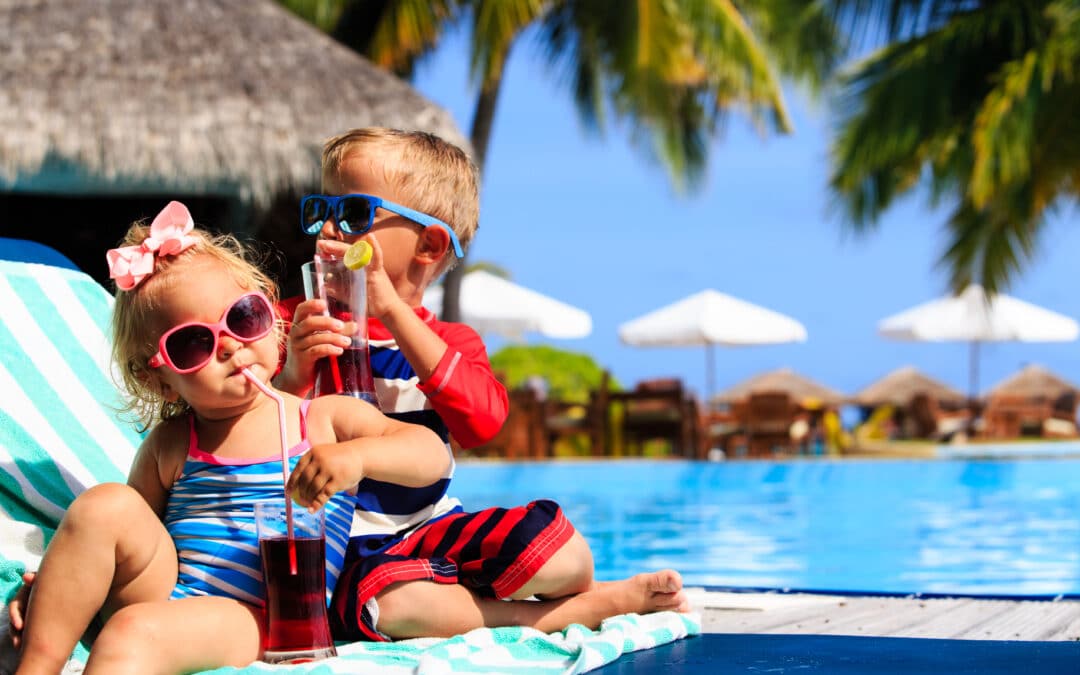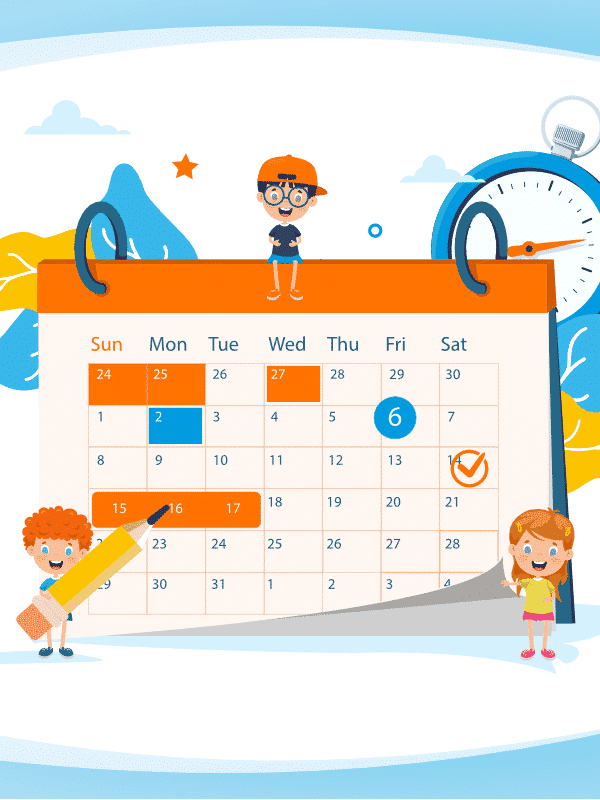Planning a family vacation? Awesome! That’s one of the best ways your kids can practice their Spanish skills. Help them learn some Spanish vocabulary for vacation, so they can use it during the trip.
If you don’t know where to start, relax. TruFluency Kids is here to help. Who knows? Maybe you’ll learn something new as well.
40 Spanish Words for Vacation
- Vacation – Vacaciones
- Trip – Viaje
- Roadtrip – Viaje por carretera
- Family trip – Viaje familiar
- Suitcase / Suitcases – Maleta / Maletas
- Bus – Camión
- Plane – Avión
- Train – Tren
- Boleto – Ticket
- Airport – Aeropuerto
- Bus station – Central de camiones
- Adventure – Aventura
- Activity / Activities – Actividad / Actividades
- Country – País
- Beach – Playa
- City – Ciudad
- Mountains – Montañas
- Cruise – Crucero
- Disneyland – Disneylandia
- Skyscrapers – Rascacielos
- Museum – Museo
- Sand – Arena
- Sea – Mar
- Sun – Sol
- Palms – Palmeras
- Ball – Pelota
- Flotadores – Floats
- Sunscreen – Bloqueador / Protector Solar
- Swimsuit – Traje de baño
- Non-alcoholic Pina Colada – Piña colada sin alcohol
- Snow – Nieve
- Hotel – Hotel
- Hostel – Hostal
- Habitación – Room
- Children’s party – Fiesta de niños
- Camera – Cámara
- Picture / Photos – Fotos
- Summer – Verano
- Winter break – Vacaciones de invierno
- Map – Mapa
16 Spanish Verbs for Vacation
Here are some common verbs in Spanish kids use when they’re on vacation:
- To have fun – Divertirse
- To travel – Viajar
- To go on vacation – Irse de vacaciones
- To relax – Relajarse
- To rest – Descansar
- To fly – Volar
- To be tired – Estar cansado/cansada
- To swim – Nadar
- To visit – Visitar
- To play – Jugar
- To camp – Acampar
- To ski – Esquiar
- To pack – Empacar
- To take off – Despegar
- To land – Aterrizar
- To arrive – Llegar
Spanish Phrases and Questions for Vacation
Here are some popular phrases and questions in Spanish using the words above kids tend to say:
- Where are we going? / ¿A dónde vamos?
- Are we going to the beach? / ¿Vamos a la playa?
- Can I take Mr. Bear? / ¿Puedo llevarme al señor Osito?
- Guess what? Mom told we’re going to Colombia for vacation! / ¿Adivina qué? ¡Mi mamá me dijo que nos vamos de vacaciones a Colombia!
- Have a nice trip! / ¡Ten un buen viaje! or ¡Buen viaje!
- I’ve already traveled to Argentina two times! / ¡Ya he viajado a Argentina dos veces!
- Are we there yet? / ¿Ya llegamos?
- Can we go to the pool? / ¿Podemos ir a la alberca?
- Let’s make sandcastles! / ¡Hay que hacer castillos de arena!
- Wow! The plane is huge! / ¡Wow! ¡El avión es gigante!
- I’m tired. / Estoy cansado(a)
- Can I have a pina colada, please? / ¿Puedo tomar una piña colada, por favor?
- Look at that skyscraper, it’s really tall! / Mira ese rascacielo ¡Está muy alto!
- Let’s go swimming! / ¡Vamos a nadar!
- Thanks, but I don’t need floats anymore. / Gracias, pero ya no necesito flotadores.
- Do people speak Spanish there? / ¿La gente habla español ahí?
- ¿Are we going to a museum? / ¿Vamos a ir a un museo?
- I love camping! / ¡Me encanta acampar!
- Look, mommy! There’s a party for kids at the hotel, can I go? / ¡Mira, mami! Hay una fiesta para niños en el hotel, ¿puedo ir?
- Can we please go skiing? / ¿Podemos ir a esquiar, por favor?
- I had tons of fun during the trip! / ¡Me divertí mucho en el viaje!
Tips to Help Your Kids Practice Their New Words Before the Trip
Speak to them in Spanish. Kids love to do what their parents do. So, if you use any of those words when speaking to them, they’ll eventually learn them and use them as well. If they already know a bit of Spanish, you can even tell them the news about the trip in Spanish.
For example: “¿Adivina qué? ¡Vamos a ir a Barcelona en el verano!” (Guess what? We’re going to Barcelona for the summer!) Always make sure you sound excited when speaking Spanish, so they also feel happy that they know another language.
Make a Spanish activity related to your vacation. It doesn’t have to be something too big. You can just make them draw the place you’re going to and then explain the drawing to you in Spanish.
For example: If you’re going to the beach, make them draw it. Then, ask them “what is this?”, while pointing at something from the drawing. They’ll have to say, “es el mar” (it’s the sea), or whatever it is. Extra points to you if you ask the questions in Spanish: “¿qué es esto?”
If they prefer coloring, you can print a drawing from the place you’re visiting. Then you could say a part of that drawing in Spanish and tell them to color it a specific color. If they make a mistake, you’ll know they need to practice that word you told them a little bit more.
For example: You tell your kids: “paint the mar blue” and if they paint it green maybe they’re confused with what the word “mar” means. It’s like a game.
Ask them questions in Spanish about the trip, so they answer with their newly acquired vocabulary. This will encourage Spanish conversation. Plus, it’s beneficial not just for their language skills, but also for their feelings. Because they’ll feel included in the trip and some decisions.
Questions to Ask Your Kids about the Trip
- Where do you think we’re going? / ¿A dónde crees que vamos?
- Do you think it’ll be hot or cold? / ¿Crees que haga calor o frío?
- Do you want to go to the pool or the beach? / ¿Prefieres ir a la alberca o a la playa?
- What do you want to do today? / ¿Qué quieres hacer hoy?
- Are you liking Puerto Rico? / ¿Te está gustando Puerto Rico?
- Did you like the museum? / ¿Te gustó el museo?
- Do you want to see the Mickey Mouse show? / ¿Quieres ver el show de Mickey Mouse?
- Which traditional food would you like to try? / ¿Qué comida típica quieres probar?
- Try this traditional candy, it’s delicious! / ¡Prueba este dulce típico, está delicioso!
- What did you like the most about Chile? / ¿Qué fue lo que más te gustó de Chile?
- Did you have fun? / ¿Te divertiste?
Tips to Help Your Kids Practice Their New Vocabulary During the Trip
New rule: Whatever they want to ask you, they must ask it in Spanish. It doesn’t matter if they make mistakes, that’s okay, because they’re learning. It’s also fine if they don’t ask everything in Spanish; it will all depend on their level.
But they must at least say the words taught in this blog in Spanish. So, if they want to ask you to go to the pool, they have to say: “¿Podemos ir a la alberca, por favor?” If they’re not advanced, they have to at least say pool in Spanish: “Can we go to the alberca, please?
Speak to them in Spanish. Yes, this one also applies when you’re already in your country of destiny. If they hear you speak in Spanish, they’ll probably want to do the same.
So, maybe don’t say everything in Spanish, but a few things every now and then. For example: When you’re about to visit a new place, tell them: “Vamos a ir al zoológico!” (We’re going to the zoo).
When you’re looking around the new country, pretend you don’t know how to say a word in Spanish that you know they’ve been studying. Ask them how it is said, they’ll love to teach you.
Encourage your kids to ask something to a native speaker, especially a hotel worker, every now and then. Don’t leave them alone, of course.
But, for example, if the waitress comes to your table, motivate your children to ask for their pina colada in Spanish. Your support means the world to them, and it’ll help them face their fears of speaking in another language.
If you’re in a Hispanic country, encourage them to play with other kids. Some hotels even have children’s areas and parties or activities for kids.
This is the perfect opportunity for them to make new friends and practice their Spanish with natives. Most likely they won’t even feel pressure, because it will all be about having fun.
Prepare Your Kids for Their Next Adventure with TruFluency Kids!
Now you have a great list of Spanish vocabulary for your kids’ vacation. But there’s always something more you can do to prepare them for their next Spanish adventure.
Maybe that new adventure comes in the form of another trip, making foreign friends, watching a movie about any Hispanic culture. Or even playing a game from a Spanish speaking country or cooking a Hispanic recipe.
Whatever the case, TruFluency Kids doesn’t want to miss your kids’ Spanish journey for the world! So we’ll help them improve their language skills.
We have native teachers that will make sure your children expand their Spanish vocabulary even more! They also base every lesson in our Bellieu method, which consists in practicing what you’ve learned through speaking.
So, be sure that your kids will become fluent in Spanish. You might even watch them make friends during their next trip to a Spanish-speaking country!
The best of all is that our classes are completely online and we offer flexible schedules. And if your children missed a class, no worries, tell us and they’ll jump into another one.
It’s as easy as that, because we know parents’ agendas are very busy. And we want to help you give your kids the opportunity of a bilingual education.
Just sign up for our next four-week session and watch your kids and watch your kids grow into amazing Spanish speakers. They can take a trial class first.


